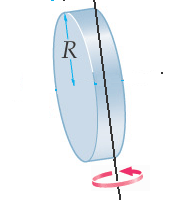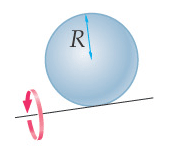Moment of Inertia:
Torque created by external forces in rotating motion.
When a particle is rotating it has tangential acceleration and radial acceleration.
Radial acceleration = ω²r
Hence radial force acting on it = m ω²r
Tangential acceleration = dv/dt = rdω/dt = r α
ω = angular velocity
α = angular acceleration
Tangential force = mrα
Torque created by radial force is zero as the force intersects the axis of rotation.
Tangential force and axis are skew (they do not intersect) and they are perpendicular. Thus the resultant torque is Force*radius = mr²α
In the case of a body having ‘n’ particles and rotating, the total torque is equal to torque acting on each of the particles
Total torque on the body = Γ(total) = Σ miri²α
Σ miri²α is called as moment of inertia.
Moment of inertia can be calculated using the above formula for collection of discrete particles.
For continuous bodies:
If the body is a continuous, the technique of integration needs to be used. We consider a small element of the body with mass dm and having a perpendicular distance from the axis or line about which moment of inertial is to be calculated.
We find ∫ r²dm under proper limits to get the moment of inertia of the body.
r²dm is the moment of inertia of the small element.
Moment of Inertia and Radius of Gyration for different bodies
| BODY | axis of rotation | image | M.I | Radius of Gyration |
|---|---|---|---|---|
uniform rod | perpendicular to its plane passing through its centre | ML2/12 | L/2√3 | |
uniform rod | perpendicular to its plane passing through its end | ML2/3 | L/√3 | |
Ring | perpendicular to its plane passing through its centre | MR2 | R | |
Ring | along its diameter | MR2/2 | R/√2 | |
Ring | along a tangent in its plane | 3MR2/2 | √(3/2)R | |
Ring | along a tangent perpendicular to its plane | 2MR2 | √2R | |
Disc | perpendicular to its plane passing through its centre | MR2 /2 | R/√2 | |
Disc | along its diameter | MR2/4 | R/2 | |
Disc | along a tangent perpendicular to its plane | 3MR2/2 | √(3/2)R | |
Disc | along a tangent in its plane | 5MR2/4 | √5R/2 | |
Hollow Sphere | along its diameter | 2MR2/3 | √(2/3)R | |
Solid Sphere | along its diameter | 2/5MR2 | √(2/5)R | |
Solid Sphere | along a tangent | 7MR2/5 | √(7/5)R | |
Solid Cylinder | about its own axis | MR2/2 | R/√2 | |
Solid Cylinder | about an axis passing through its centre of mass and perpendicular to its plane | M(L2/12+R2/4) | √(L2/12+R2/4) | |
Hollow Cylinder | about its own axis | MR2 | R | |
Hollow Cylinder | about an axis passing through its centre of mass and perpendicular to its plane | M(L2/12+R2/2) | √(L2/12+R2/2) | |
Rectangular lamina | about an axis passing through its centre of mass and perpendicular to plane | M[(L2+b2)/12] | √[(L2+b2)/12] |














